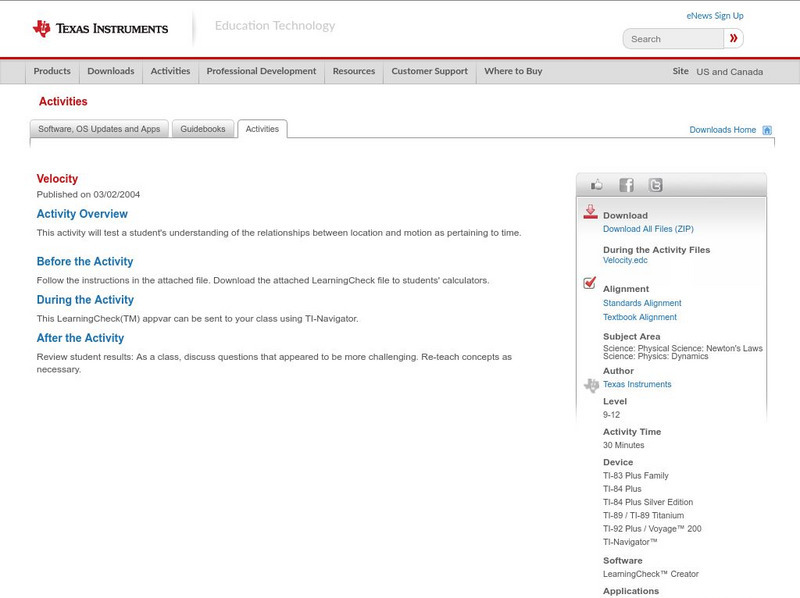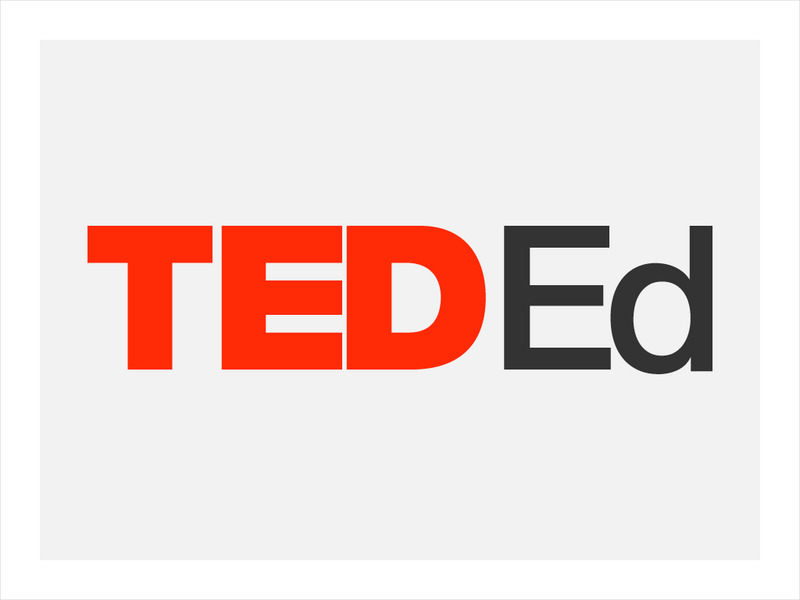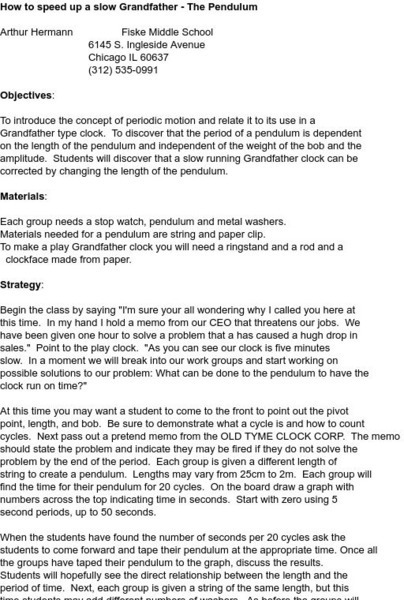Physics Aviary
Physics Aviary: Circular Acceleration
This program gives students a visual representation of why an object moving in a circle at constant speed is accelerating. This program will guide students through a method of calculating the circular acceleration based on the change in...
Physics Aviary
Physics Aviary: Circular Force Lab
This lab is designed to have students find the relationships that affect the force required to keep an object moving in a circle. Students will be able to modify the mass of the object, the speed of the object and the size of the circle...
Physics Classroom
The Physics Classroom: Newtons Laws: Skydiving Interactive
Students explore the motion of an object falling under the influence of air resistance. Force arrows and values are shown as the object falls, and a speedometer displays the speed of the object. The mass of the falling object and the...
Physics Classroom
The Physics Classroom:einstein Theory of Special Relativity: Length Contraction
One of the peculiar aspects of Einstein's theory of special relativity is that the length of objects moving at relativistic speeds undergoes a contraction along the dimension of motion. These animations depict this phenomena of length...
Texas Instruments
Texas Instruments: Velocity
This activity will test a student's understanding of the relationships between location and motion as pertaining to time.
Science Education Resource Center at Carleton College
Serc: Direction of Acceleration
In this short lab, young scholars use Tonka trucks to observe the acceleration of a object as it initiates acceleration, maintains a steady speed, and slows to a stop.
TED Talks
Ted: Ted Ed: The Fundamentals of Space Time: Part 2
In this second installment of a three-part series on space-time, CERN scientists Andrew Pontzen and Tom Whyntie use a space-time diagram to analyze the sometimes confounding motion of light. [4:50]
Physics Aviary
Physics Aviary: Practice Problems: Energy/momentum Ballistic Pendulum
Students must predict the pre-collision speed of a ball that has been captured by a ballistic pendulum.
Physics Aviary
Physics Aviary: Practice Problems: 2 D Momentum Conservation With Energy
Students must predict the KE added to the system when a Kuiper Belt Object is hit with an explosive charge. Students must first look at the momentum of each piece after the explosion to determine the original speed of the Kuiper Belt...
Physics Aviary
Physics Aviary: Practice Problems: Ice Bucket Challenge
Students must calculate the maximum and minimum speeds for a bucket whirled in a vertical circle.
Physics Aviary
Physics Aviary: Practice Problems: Ice Bucket Challenge Level 1
Students must calculate the maximum and minimum speeds for a bucket whirled in a vertical circle.
Other
Usra: Lunar and Planetary Institute: Hot Spot Activity [Pdf]
In this lesson plan, young scholars will measure the distances between Hawaiian islands, and convert and graph their data to determine the speed of the Pacific Plate.
Khan Academy
Khan Academy: What Is the Maxwell Boltzmann Distribution?
In a gas, there are lots of molecules traveling at lots of different speeds. Here's a framework for thinking about that.
Concord Consortium
Concord Consortium: Molecular Workbench: Maxwell Speed & Velocity Dist.
Adjust the temperature in this simulation to observe the effects to moving particles. Graphs can be created from collected data.
Science and Mathematics Initiative for Learning Enhancement (SMILE)
Smile: How to Speed Up a Slow Grandfather: The Pendulum
In this lesson plan students are "given one hour to solve a problem that a has caused a huge drop in sales" for a clock company. All clocks are five minutes slow. Because of this, they must find a way to put the clock back on time...
Physics Aviary
Physics Aviary: Projectile Lab
This lab is designed to have students find the relationships that affect the horizontal distance travelled by a projectile. Students will be able to modify the starting height, initial speed and angle at which the projectile is fired....
Physics Aviary
Physics Aviary: Ground to Ground Soccer Kick Lab
This lab is designed to have students find the relationships that govern the behavior of a soccer ball that is kicked on an angle. The ball will start on the ground and end on the ground. Students will have control over the speed of the...
Physics Aviary
Physics Aviary: Satellite Lab
This lab is designed to allow students to explore different aspects of satellite motion. Students can vary the mass of the satellite, the orbital radius of the satellite and the body that the satellite is orbiting. Students can measure...
Physics Aviary
Physics Aviary: Practice Problems: Finding Velocity in a Ground Soccer Kick
Students must determine where a soccer ball will land based on the speed with which it is kicked. Students will also need to find the time in the air and the maximum height obtained by the projectile. This problem does not take place on...
Physics Aviary
Physics Aviary: Practice Problems: Ground to Ground Soccer Kick Problem
Students must determine where a soccer ball will land based on the speed with which it is kicked. Students will also need to find the time in the air and the maximum height obtained by the projectile. This problem does not take place on...
Physics Aviary
Physics Aviary: Velocity Vector in 3 D
A program that will randomly move an object from one location to another in three-dimensional space. You must determine the three components of the velocity vector that is created by this movement and also the speed of the object during...
Physics Classroom
The Physics Classroom: Vectors and Projectiles: The Truck and the Ball
Imagine a pickup truck moving with a constant speed along a city street. In the course of its motion, a ball is projected straight upwards by a launcher located in the bed of the truck (with no air resistance). This animation depicts the...
Physics Aviary
Physics Aviary: Drone Delivery Lab
This lab is designed to have students find the relationships that govern the behavior of a package that has been released by a drone that is flying horizontally. Students will have control over the drone's height and horizontal speed....
Physics Aviary
Physics Aviary: Impulse Lab
This lab is designed to have students find the relationships between impulse and change in momentum. Use the fire extinguisher to give different impulses to Wally and then use the time he is passing through the photogates to find the...
Other popular searches
- Motion and Speed
- Forces and Motion Speed
- Motion Speed and Velocity
- Force Motion Friction Speed
- Motion Speed and Distance
- Motion Speed
- Motion, Speed and Distance
- Motion Speed Velocity
- Describing Motion Speed
- Motion and Speed Labs
- Slow Speed Motion
- Speed and Motion Graphs








